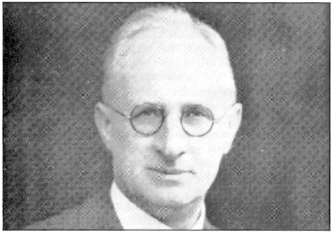|
Mr. A. James, B.A. Headmaster from the opening of the school in 1912 until 1934.
H. F. DAVEY (1912 - 1918)
There were about eighty boys in the school then, with 21 in my form. The full staff was: Mr. James, the Headmaster, Mr. Weaver, Mr. Morris, Mr. Turner, Mr.Vallance, Mr. Carter, Mr. Randall, Mr. Holton, Mr. Platnau and Mr. Gale, my form teacher. The school was lit by gas-lamps, which were lit on winter afternoons
by the caretaker, Mr. Wheelwright. My first year at King's Norton was clouded by the death of my mother in August. In the following month Harold Cox joined my form and we progressed through the school until July 1918. He is now Lord King's Norton. With the outbreak of war in August 1914 life changed for everyone. I still have my school diary for 1916, in which the following entries occur: March 6th, Zeppelin raid about 1.00a.m. Went downstairs. May 25th, 8 Serbian boys came to school this morning. September 15th, Heard of lllingworth's death at the Western Front. Leaving aside the austerities and tragedies of the First World War, school life for me was a happy time. I remember all the little excitements, such as finding myself selected to play right half for the 2nd XI Football Team - winning an internal scholarship seemed far less exciting. Both Mr. James and Mr. Weaver were strict disciplinarians, always reminding us that as well as educating us, schooling was intended to help us become good citizens. However, I remember one lunchtime, when I was playing chess with a form mate, the Headmaster entered to start an English lesson. He told us to continue playing and at intervals during the lesson he inspected our progress; he was a keen chess player himself! No English for us that day. My last memory of King's Norton was having to have a handkerchief covering my nose and mouth when sitting for the Oxford Senior examination. This was a precaution against falling victim to the Spanish Flu which was rampant in 1918. It was said that more died from that epidemic than were killed in the War. Blame was attached to the lack of resistance due to the poor quality of the diet we endured during the War. I have only one regret. I delayed joining the Old Nortonians Association
until 1952. J. D. DOBSON (1915 - 1922)
Our much-respected and beloved Maths master, Harry Hale, had an invariable routine. On entering the room he removed his gown, turned back the cuffs of his jacket to avoid contact with the blackboard and then warmed his backside at the fire, leaning his back against the edge of the mantelpiece and moving from side to side. I cannot remember who thought of the idea of anointing the edge of the mantelpiece with coloured chalks, but the result was that Mr. Hale's blue suit assumed the appearance of Joseph's Coat. Since he replaced his coat before leaving the room, the trouble was not discovered until he reached home. His reaction the next day was to come into the room, peer at the mantelpiece and merely remark: "So that's how it's done." No wonder he was so popular. The blackboard was supported by an easel which lacked a cord to prevent it doing the splits. When Mr. Thorpe joined the staff and first took the Sixth he smote the blackboard with such unwonted vigour that the whole contraption collapsed. He turned on us with: "So this is how you greet a new master!" I doubt whether we ever persuaded him that he was not a victim of a trap. One day in the Fifth Year, our History Master was absent and Mr. Weaver, whose normal subject was Literature, took over. We dealt with the Battle of Chesapeake Bay, which Mr. Weaver insisted on calling Chesa-pe-aka Bay. Among our number was Bobby James - later Dr. Robert James of the Dunlop Rubber Company and now, I believe, living in retirement somewhere in East Anglia. Bobby was not only one of our most talented scholars but also one of the form's humourists. Mr. Weaver had never disclosed to us that he had any sense of humour. I believe he was known among other masters as 'Faithful until Death.' We were, therefore, shocked and then convulsed when in the next Literature period Bobby rose with a pained expression on his face and asked: "Shall we be studying Shaka-spay-ara Sir?" I remember the Sports Day in which barrels suspended by ropes were introduced into the obstacle race. I was never sure whether it was Vern Hackett or Lord King's Norton who dived through a barrel and emerged debagged - his shorts having caught on a nail; but at a recent dinner Vern admitted that he was the victim. The first Headmaster, Mr. James, had no secretary and occasionally Sixth-Formers were called upon for clerical duties. Those who knew him will recall that Mr. James was very particular about vowel sounds. I was in his study during an entrance examination when he was interviewing candidates. A boy was admitted to his room and the conversation went something like this: "What is your name, boy?" The reply evidently sounded to the Head like 'Woite', whereupon he turned to me and said, "This boy's name is White." "No Sir." "Spell it boy." "Guoite Sir." I remember I stifled a laugh with difficulty.
|
